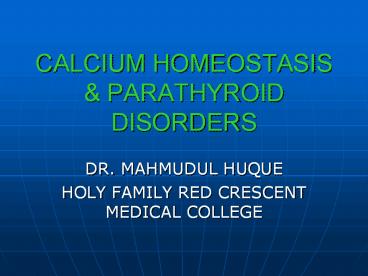CALCIUM HOMEOSTASIS - PowerPoint PPT Presentation
Title: CALCIUM HOMEOSTASIS
1
CALCIUM HOMEOSTASIS PARATHYROID DISORDERS
- DR. MAHMUDUL HUQUE
- HOLY FAMILY RED CRESCENT MEDICAL COLLEGE
2
(No Transcript)
3
Calcium Homeostasis
- calcium homeostasis is the mechanism by which the
body maintains adequate calcium levels.
Derangements of this mechanism lead to
hypercalcaemia or hypocalcaemia, both of which
can have important consequences for health.
4
- Normal range
- 910.5 mg/dL or
- 2.22.6 mmol/L
5
Corrected Ca level
- Corrected calcium (mg/dL) measured total Ca
(mg/dL) 0.8 X (4.0 - serum albumin g/dL
6
Hypercalcemia
- Polyurea, polydipsia
- Renal colic, lethargy
- Anorexia, nausea, dyspepsia
- Peptic ulcer, depression, drowsiness
- Impaired cognition
- Acute/chronic onset
- Malignant Hypercalcaemia Cagt12 mg/dl
7
Causes of Hypercalcemia
- Abnormal parathyroid gland function
- Primary or tertiary hyperparathyroidism
- Lithium induced
- familial hypocalciuric hypercalcaemia
- Malignancy
- Lungs, breast, renal, ovarian, colon, Thyroid
malignancy. - haematologic malignancy (multiple myeloma,
Lymphoproliferative disorders)
8
Contd
- Vitamin-D metabolic disorders
- hypervitaminosis D (vitamin D intoxication)
- elevated 1,25(OH)2D levels (e.g. sarcoidosis)
- Others
- Thyrotoxicosis TSH, FT3, FT4
- Thiazide use
- Paget's disease of the bone
- Addisons disease
- severe secondary hyperparathyroidism
- milk-alkali syndrome
9
Treatment
- Hydrate with Normal saline 4-6L deficient
- Diuretics Look for K, Mg
- Salmon calcitonin BD, 5-8 u/Kg, 3-4 days
- BISPHOSPHONATES Pamidronate Zoledronic acid
- Plicamycine / Gallium nitrate (toxic)
- Steroids 40mg/day In granulomatous sarcoidosis
- Haemodialysis
- Treat cause
10
Hypercalcaemia
- Oral, perioral and acral paresthesias, tingling
or 'pins and needles' sensation. This is often
the earliest symptom of hypocalcaemia. - Carpopedal Spasm and generalized tetany
- Latent tetany Trousseau sign of latent tetany
(eliciting carpal spasm by inflating the blood
pressure cuff and maintaining the cuff pressure
above systolic). - Chvostek's sign (tapping of the inferior
portion of the zygoma will produce facial
spasms). - Epilepsy, Psycosis
- Papilloedema
- Basal ganglia Calcification
- Metastatic calcification
- Severe Hypocalcaemia lt6mg/dl
11
Causes of Hypocalcaemia
- Absent parathyroid hormone (PTH)
- Hereditary hypoparathyroidism
- Following parathyroidectomy
- Following thyroidectomy, the parathyroid glands
are located very close to the thyroid and are
easily injured or even accidentally removed
during thyroidectomy - In DiGeorge Syndrome, a disease characterized by
the failure of the third and fourth pharyngeal
pouches to develop, the parathyroid glands do not
form and there is thus a lack of PTH. - Storage Al, Cu, Fe
- Trauma or vascular formation
12
Contd.
- Alkalosis Resp. Metabolic
- CRF
- Vit. D deficiency, Malabsoption syndrome
- Pseudo hypoparathyroidism
- Acute pancreatitis
- Drug- Ca lowering drugs
- Massive Blood transfusion
- Osteoblastic metastasis
13
Treatment of Hypocalcaemia
- If alkalosis Rebreath expired air or 5 CO2 in
O2 . - 10 Calcium gluconate slow IV to keep Ca gt7mg/dl
till relief. - Oral Calcium 1.5-3 gms elemental Ca, 500 mg of
Ca tab. - If serum Ca fall bellow 7mg/dl, give again after
6hrs Ca gluconate Upto 100mg/day. - Tab. 1a in persistant hypo parathyroidism
- Magnesium (nalepsin) in calcium resistant persons
14
Hyperparathyroidism
Primary Single adenoma-90 Multiple adenoma-4 Nodular hyperplasia-5 Carcinoma-1 S. Ca PTH
Secondary CRF (specially) Malabsorption Osteomalacia ricket S.Ca PTH
Tertiary Esp. CRF S. Ca PTH
15
Contd.
- Serum biochemical hyper and hypo calcaemia
occupies the clinical spectrum of parathyroid
disease. So are the features of hyper/hypo
calcaemia.
16
Diagnosis
- Features of hypercalcaemia
- PTH radio-immuno assay
- 24 hr urinary calcium increased
- Radiology Osteitis fibrosa cystica,
- Pepperpot skull,
- Bone cyst- brown tumour
- Tumour localisation by- Surgery, USG, CT, Neck
catheterisation, PTH measurement, Technetium
isotope imaging.
17
Treatment
- Manage hypercalcaemia
- Remove the tumour
- Tagging the remnant
- Transplant in symptomatic, young progressive
- Secondary Calcitriol to suppress PTH
- Tertiary Remove
18
Hypoparathyroidism
- Hypocalcaemia, signs and symptoms of decreased
Ca. - Hyperphosphatemia
- Undetectable PTH
- Exclude serum Mg deficiency. If () Functional
Hypoparathyroidism.
19
Hypoparathyroidism
- It is due to destruction,
- surgery,
- Vascular damage, or
- idiopathic as part of poly-glandular failure or
agenesis (DiGeorge syndrome)
20
Pseudohypoparathyroidism
- Pseudohypoparathyroidism is a condition
associated primarily with resistance to the
parathyroid hormone. Patients have a low serum
calcium and high phosphate, but the parathyroid
hormone level (PTH) is actually appropriately
high (due to the hypocalcaemia). - Increased PTH biochemically Low Ca and High PO4
body stigma. - Features Short stature, obese with round face,
short 4th and 5th metacarpal, mental retardation,
defective teeth bone formation
21
- Short stature, obese with round face
22
Short 4th and 5th metacarpals
blunting of the fourth and fifth knuckles of the
hand
23
Pseudopseudohypoparathyroidism
- Pseudopseudohypoparathyroidism (pseudoPHP) is an
inherited disorder, named for its similarity to
pseudohypoparathyroidism in presentation. The
term pseudopseudohypoparathyroidism is used to
describe a condition where the individual has the
phenotypic appearance of pseudohypoparathyroidism,
but is biochemically normal. - It is sometimes considered a variant of Albright
hereditary osteodystrophy.
24
Young woman with short stature, disproportionate
shortening of the limbs, generalized obesity, and
round, flattened face. Radiograph of the hand
showing the shortened 4th and 5th metacarpals
25
Thank You































